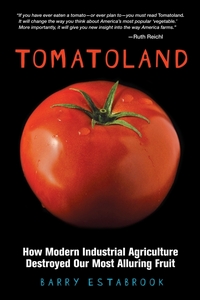In his book Tomatoland: How Modern Industrial Agriculture Destroyed Our Most Alluring Fruit, Berry Estabrook explores why tomatoes seem to have lost their flavor, their je ne c’est quoi.
Estabrook is a freelance food writer whose work has appeared in The Atlantic, The New York Times and The Washington Post,
In a recent interview with Fresh Air’s Terry Gross, he reveals some pretty shocking details about the tomato industry that made me run out to my garden and make sure my tomatoes are growing well enough to freeze extra to get me through the winter.
Although I buy organic, and Estabrook’s research focuses on mass-produced tomatoes, the interview reinforced why it’s important to do all those things we are told. More specifically to buy local, organic and sustainable foods. He acknowledges that those terms are overused to the point where everyone repeats the mantra, but many don’t know why.
Estabrook’s reasons for doing these things are compelling. First, the tomato has been bred to be resistant to the point that it can fall of a moving truck, roll into a ditch and not have a single crack or bruise. The breeding has created an indestructible, tasteless tomato that has been subject to 110 different fungicides, pesticides and herbicides. Estabrook focuses much of his study on the tomato industry in Florida. He points out that Florida is not an optimal environment for tomatoes due to the high humidity, and the fact that they are grown in sand. Sand grown tomatoes are not nutrient dense, and as stated before, pretty tasteless. If we buy local, our tomatoes do not need to be bred for intense travel, and they will be more flavourful. If you question that, just buy a non-organic tomato, and buy an organic farmer’s market tomato and see for yourself. If we buy organic, we are not subjecting our bodies to fungicides, pesticides, and herbicides, and we are getting more nutrient dense foods.
So how about sustainable? Tomato farmers in Florida feel the squeeze from the big chain grocery stores for lower prices. Because the only real play in expenditures the farmers have is in how they pay their workers, the workers suffer. Suffer so much in fact that Florida tomato farmers had actual slaves, no not a metaphor, slaves.
Estabrook says in the interview that “[t]hese were people who were bought and sold. These were people who were shackled in chains at night or locked in the back of produce trucks with no sanitary facilities all night. These were people who were forced to work whether they wanted to or not and if they didn’t, they were beaten severely. If they tried to escape, they were either beaten worse or in some cases, they were killed. And they received little or no pay. It sounds like 1850. … There have been seven [legal cases] in the last 10 or 15 years … successfully brought to justice in Florida involving slavery. And 1,200 people have been freed. The U.S. Attorney for the district in Southern Florida claims that that just represents a tiny, tiny tip of an iceberg because it’s extraordinarily difficult to prosecute a modern-day slavery case.” Clearly, that is not “sustainable”.
At the end of the interview he touches on the shrimp industry. The shrimp industry in another example of what not being sustainable is. He points out the sharp decrease in the price of shrimp over the years. How shrimp cocktail used to be a treat reserved for fancy steak houses, and now they are everywhere, and cheep. The majority of the shrimp consumed today comes from Asia. They live in poo ponds basically. Living in spaces that are infested with poo and disease, then treated with strong antibiotics. Some of the antibiotics are not legally used in shrimp and lead to serious problems when consumed by people. As we all know, China does not have a stellar record on quality control, and even if I weren’t already vegan, after this interview I would at the very least not be eating shrimp.
This is the perfect time of year for amazing tomatoes, and farmer’s markets are a great way to spend time with family and friends. Get out there and buy yourself some organic tomatoes, while at the same time supporting your local economy, improving your health, and improving working conditions in this country by not giving your money to mass producers. For the full interview, go the NPR’s website. It’s worth a listen!

Leave a Reply